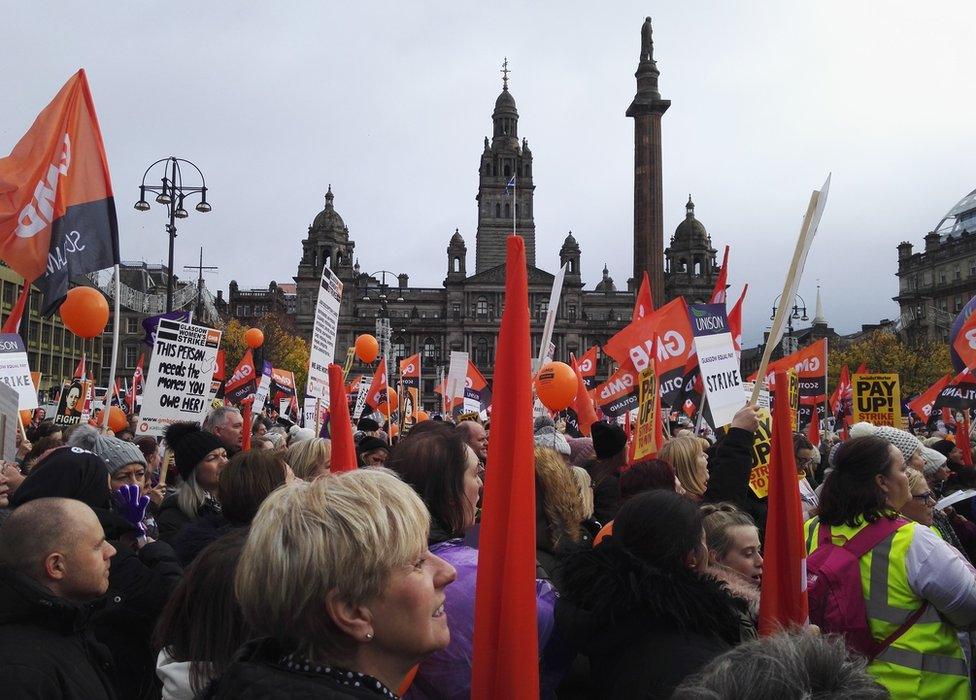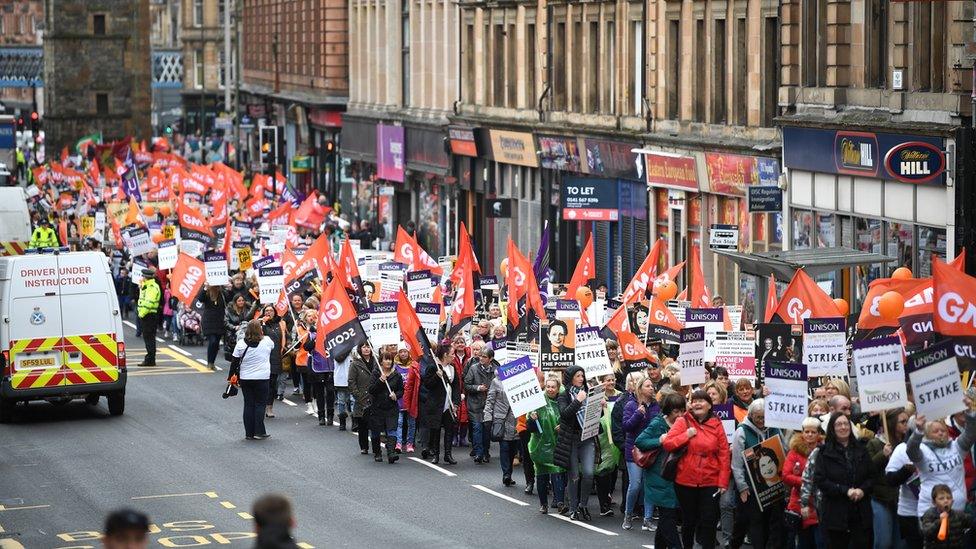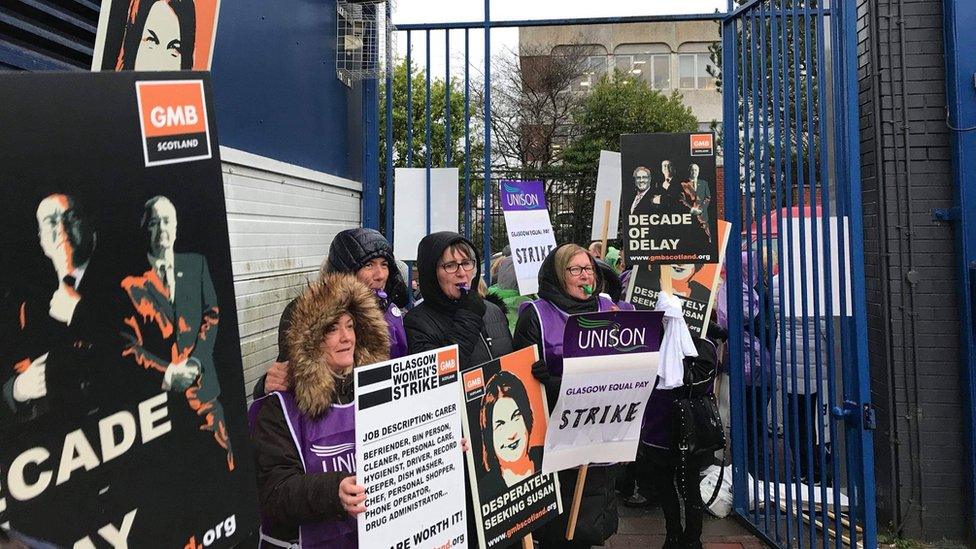Schools and home care disrupted by Glasgow equal pay strike
- Published

The strikers marched to George Square for a rally in front of City Chambers
Hundreds of schools were shut and home care services affected in Glasgow as council workers stage one of the UK's biggest strikes over equal pay.
Primary schools and nurseries closed and other services were hit on the first day of the 48-hour action.
About 8,000 workers are striking amid a "lack of progress" on equal pay claims from thousands of female workers, the GMB and Unison said.
Glasgow City Council said the walkout was unnecessary.
It added that it hoped to reach an agreement on the long-running issue in the coming months.
The local authority announced in January that it planned to reach a negotiated settlement to thousands of equal pay claims arising from a pay and conditions scheme introduced more than a decade ago.
Campaigners say the scheme led to workers in female-dominated roles such as catering or cleaning receiving up to £3 an hour less than those in male-dominated areas such as refuse collection.


Council services affected by the strike
All mainstream primary schools, nurseries and additional support schools closed
Secondary schools will remain open but services such as school meals will be affected
Home care services - help with washing, getting dressed, meal preparation - face significant disruption
Museums, leisure services and libraries will open but cafes and cleaning services could be disrupted

Following two judgements against the council in the Court of Session, the SNP-led administration said it had "grasped the nettle" and planned to settle about 12,000 claims.
Unions, however, say the talks - which would pave the way for payouts - have made no progress despite 21 meetings being held in the past 10 months.
Many strikers joined picket lines outside council buildings as the strike got under way on Tuesday morning.
Hundreds later gathered at Glasgow Green and set off on a march to City Chambers in George Square.
Care worker Debbie McGrath: "We are all out here heavy hearted about leaving our clients."
GMB Scotland organiser Rhea Wolfson said: "The voice of Glasgow's working women will be heard around the world. After decades of rampant sex discrimination they will tell their employer, 'Stop the delays. We want justice.'"
Unison Glasgow chairwoman Mary Dawson added: "We have given the council 10 months to make progress on addressing the historical discrimination suffered by these workers.
"However, the council has agreed nothing, offered nothing and all we have had are meetings about meetings and talks about talks. It's time for some action."
Are you affected by 48-hour strike in Glasgow? If you are prepared to speak to the BBC about its impact on you or your family please email BBC Scotland, external.

Timeline - Glasgow equal pay dispute
2006 - Glasgow City Council draws up its own bespoke job evaluation scheme, the Workforce Pay and Benefits Review (WPBR), intended to comply with equal pay law.
From 2009 claimants challenge the scheme through employment tribunals, arguing it favours workers in male-dominated roles.
May 2017 Court of Session rules that women were wrongly excluded from a bonus protection scheme. In the same month the SNP becomes the biggest party on Glasgow City Council after years of Labour control, and forms a minority administration.
August 2017 - Court of Session rules the WPBR was less favourable to women workers.
January 2018 - Glasgow City Council announces it intends to reach a negotiated settlement over equal pay.
October 2018 - GMB and Unison members stage 48-hour strike in protest at lack of progress in talks.

The SNP took control of the council in May last year after decades of Labour control with a promise to resolve the issue of equal pay.
In January the council said it would reach a negotiated settlement, and has a 30-strong team working on the details.
It insists progress has been made, and it had hoped to agree a settlement figure in December, although this could be delayed because of the industrial action.
Council leader Susan Aitken said: "I'm not entirely sure why this strike is taking place.
Council leader Susan Aitken says industrial action is unnecessary
"Negotiations have been continuing. We've made considerable progress in a number of areas."
She highlighted a decision to bring women who worked for arms length body Cordia back into direct council employment and the harmonisation of their terms and conditions.
She added: "There's going to be enormous disruption caused in Glasgow - and to some of the most vulnerable people in the city. Some people who are at end of life, receiving end of life care."
Scottish Labour leader Richard Leonard and Scottish Greens co-convenor Patrick Harvie both expressed their solidarity with the strikers.
First Minister Nicola Sturgeon said she "had nothing but admiration" for the women taking part in the dispute - but accused Labour of hypocrisy because the council, when it was Labour-controlled, had challenged the equal pay claims in the courts.
Allow X content?
This article contains content provided by X. We ask for your permission before anything is loaded, as they may be using cookies and other technologies. You may want to read X’s cookie policy, external and privacy policy, external before accepting. To view this content choose ‘accept and continue’.
Financial challenges ahead
Campaign group Action 4 Equality has estimated that backdated claims and pay increases could eventually cost the council between £500m and £1bn.
Ms Aitken has disputed that figure, but acknowledged the council faces financial challenges.

Strikers joined picket lines outside many council buildings
Some have speculated the authority may be forced to sell off assets such as the Scottish Event Campus (SEC) or the Salvador Dali masterpiece Christ of St John of the Cross, normally displayed at the Kelvingrove Art Gallery and Museum.
Earlier this year, Ms Aitken insisted officials were not discussing "flogging off the Dali" but were drawing up proposals that would minimise the impact on jobs and services.